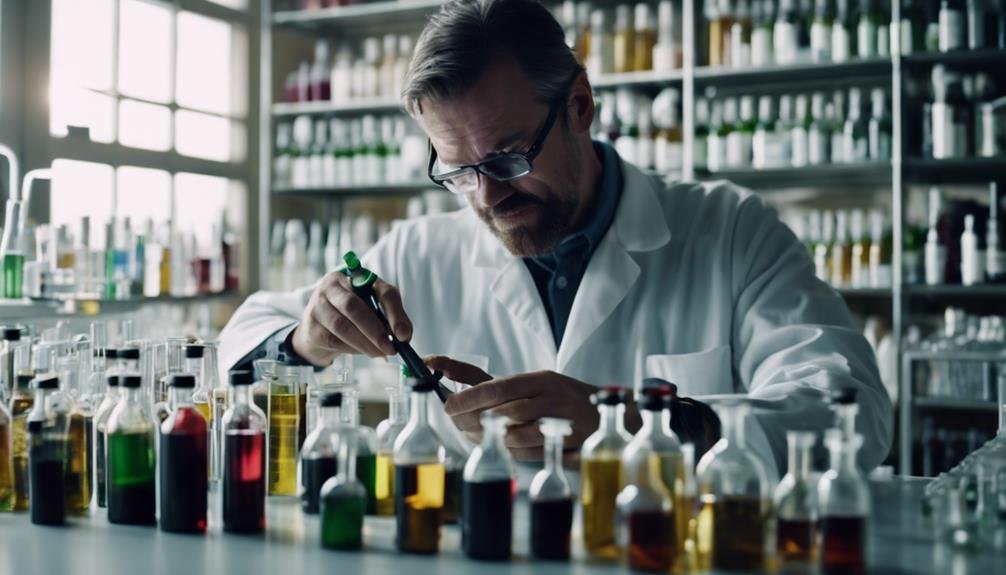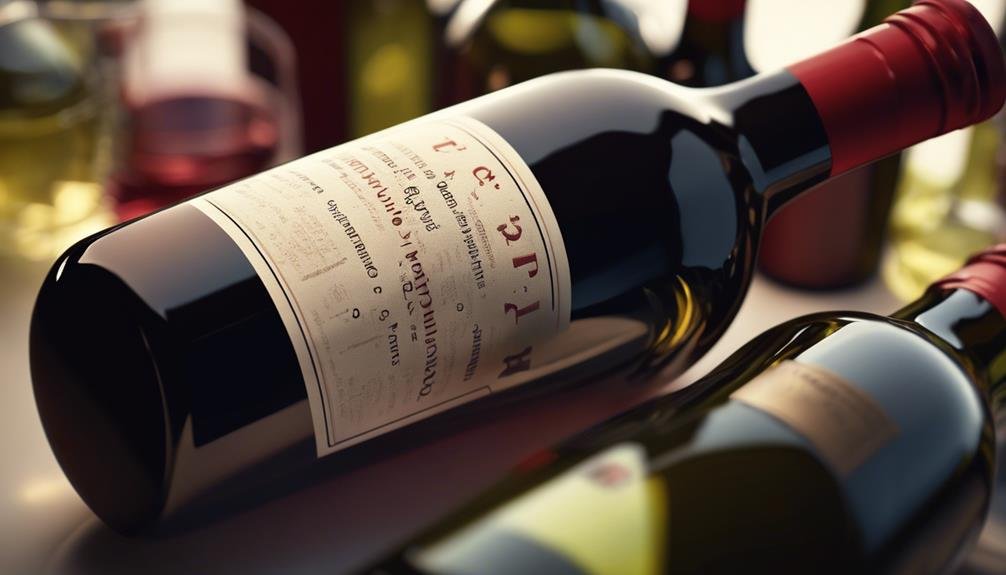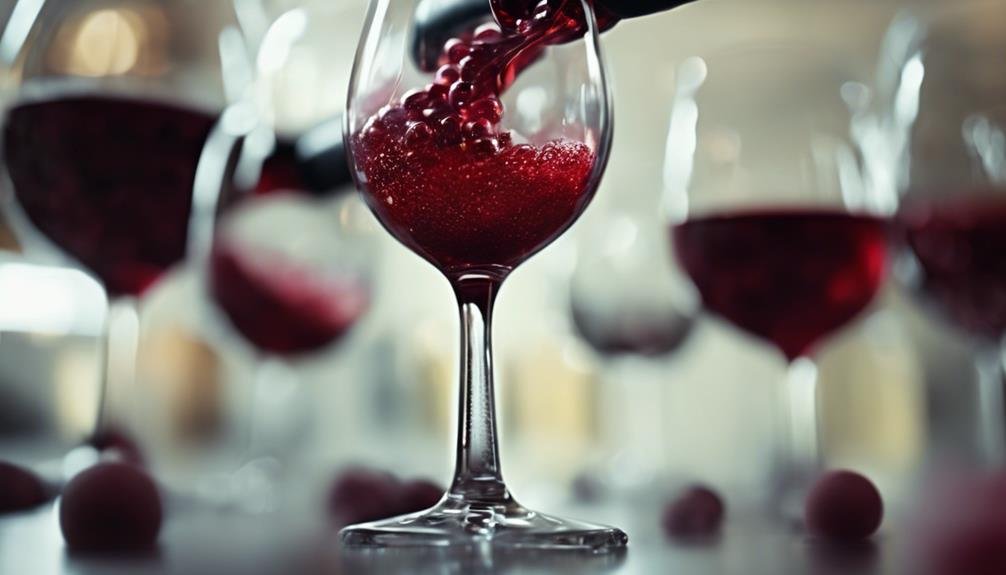Revealing the secrets of wine additives exposes a world where flavors are heightened, quality protected, and ethical debates persist in winemaking. Additives can enhance taste, correct flaws, and maintain stability. While some, like sulfites, safeguard against spoilage, others like lactic acid bacteria, soften harsh acidity. Ethical dilemmas surround additives such as sugar or tartaric acid, impacting taste. Understanding grape quality, climate conditions, and winemaking techniques aids in additive selection for desired outcomes. Consumer preferences lean towards natural additives, emphasizing the need for transparency in the industry. Regulations guarantee compliance and uphold wine quality standards, safeguarding consumer trust and interest.
Impact of Additives on Wine Quality
Frequently overlooked, the impact of additives on wine quality is a crucial aspect of winemaking that influences taste, aroma, and overall consumer perception. Additive effects vary, with some enhancing the wine's characteristics and others serving corrective purposes.
Quality impact is significant, as additives can help balance acidity, sweetness, and stability. For instance, sulfites protect wine from spoilage, while lactic acid bacteria soften acidity. The use of tartaric acid in hot-climate regions highlights how additives cater to specific grape-growing conditions.
Understanding the role of additives is essential for winemakers to achieve desired flavor profiles and maintain consistency. By carefully selecting and utilizing additives, winemakers can enhance the overall quality of their wines, ensuring a positive consumer experience.
Controversial Additives in Winemaking
Amidst the intricate world of winemaking, certain additives have sparked debate and scrutiny for their contentious roles in shaping the final product's composition and characteristics. Ethical concerns arise regarding the use of additives like sugar (Chaptalization) and tartaric acid, with some questioning their impact on the authenticity of the wine. These additives can lead to taste implications, altering the flavor profile and balance of the wine.
The practice of watering back, adding water to dilute high sugar levels, also raises eyebrows in the industry. Additionally, controversial additives such as flash pasteurization, which affects wine aromas, and copper sulfate, used to counteract faults but with potential toxicity, are under scrutiny for their effects on both the wine and consumer health.
Factors Influencing Additive Use

Factors influencing the use of additives in winemaking extend beyond controversial debates to encompass a complex interplay of grape quality, climatic conditions, and specific winemaking approaches.
The quality of grapes harvested plays an important role in determining the necessity for corrective additives such as tartaric acid in hot-climate regions lacking natural acidity. Climate variations also impact additive use, with cool-climate regions often needing sugar additions for sweetness, while hot-climate areas might require adjustments for acidity balance.
Additionally, specific winemaking techniques can influence the choice and quantity of additives utilized during the winemaking process. Understanding these factors is essential for winemakers to navigate the intricate world of additives and produce wines that meet desired quality standards.
Consumer Perception and Additives
Consumer perception of wine additives plays a significant role in shaping industry practices and consumer choices.
- Natural vs. conventional additives, consumer preferences
- Trust issues, transparency in winemaking
Consumers often prefer wines with fewer additives, leaning towards natural options over conventional ones. Trust issues arise when winemakers lack transparency in disclosing the additives used in the winemaking process. Understanding consumer preferences and building trust through transparent practices can help wineries cater to evolving consumer demands and foster loyalty.
Understanding Wine Additive Regulations

Regulations governing the use of additives in winemaking are essential for ensuring quality standards and consumer protection in the industry. Regulatory compliance and industry standards play a vital role in maintaining the integrity of wine production. Additive labeling and transparency requirements provide consumers with important information about the contents of the wine they are consuming. Below is a table summarizing key aspects of wine additive regulations:
| Regulatory Aspect | Description |
|---|---|
| Compliance Standards | Ensuring adherence to legal requirements. |
| Transparency Requirements | Providing clear information to consumers. |
| Industry Guidelines | Following established norms for additive usage. |
These regulations help uphold the quality of wines on the market while also safeguarding consumer interests.
Frequently Asked Questions
How Do Additives Affect the Aging Potential of Wine?
Additives in wine can impact aging potential by influencing flavor development, oxidation, chemical interactions, and tannin preservation. Understanding the role of additives in enhancing or hindering these aspects is essential for winemakers seeking to craft age-worthy wines.
Are There Any Health Risks Associated With Consuming Wine Additives?
Health concerns associated with consuming wine additives may arise from allergenic reactions or toxicity. Regulatory standards help mitigate risks by setting limits on additive use. Transparency in labeling is essential for consumer awareness and informed choices.
What Are the Environmental Implications of Using Wine Additives?
The environmental impact of using wine additives is a critical consideration in winemaking. Adhering to regulatory standards guarantees sustainable practices. Understanding the lifecycle of additives, waste management, and resource consumption are key steps in minimizing environmental consequences.
Can Additives Mask the True Characteristics of Grape Varietals?
Additives, while enhancing wine quality, can potentially mask grape varietals' true characteristics through flavor manipulation. Consumer perception and adherence to industry standards are vital. Transparency on additive use is essential for maintaining trust and balancing innovation with tradition.
How Do Additives Impact the Sustainability of the Wine Industry?
Additives in the wine industry impact sustainability by influencing economic viability and consumer perception. Market demand shapes industry practices, fostering a balance between tradition and innovation. Transparent use of additives is essential for ensuring industry sustainability and meeting consumer expectations.
Conclusion
In the world of wine additives, it is essential to navigate the fine line between tradition and innovation. As consumers demand transparency and natural practices in winemaking, the industry must adapt to meet these evolving preferences.
By understanding the impact of additives on wine quality, recognizing controversial additives, and adhering to regulations, winemakers can strike a balance that satisfies both tradition and modern expectations.
Let the grapevine of knowledge guide us towards exceptional wines.
